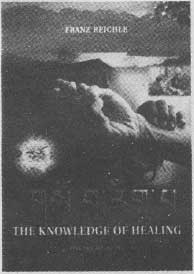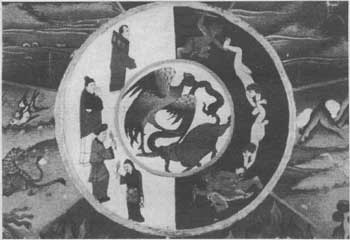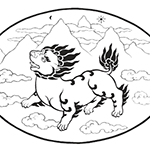| The following article is from the Winter, 1998 issue of the Snow Lion Newsletter and is for historical reference only. You can see this in context of the original newsletter here. |

The Knowledge of Healing gives a comprehensive explanation, in easy-to-understand terms, of the main principles of this ancient and highly sophisticated healing system. Rooted in Buddhist principles, Tibetan medicine sees illness as caused by an out-of-balance lifestyle and prescribes cures requiring whole life changes in addition to specific treatments. The Dalai Lama's personal physician, Dr. Choedrak, gives a fascinating overview. Presentations by other leading Tibetan physicians are complemented by discussions of exhaustive clinical trials conducted in the West that prove its effectiveness.
The wealth of practical information and data included in the book make it a valuable reference for doctors, patients, and all those interested in this timely topic. The Knowledge of Healing demonstrates the great importance of Tibetan medicine as an effective and integral healing and prevention method for modern illnesses.
In the fall of 1997, In Pictures released The Knowledge of Healing as a documentary which is being shown around the USA at select theaters. The film was made by Franz Reichle, a Swiss film-maker who has produced, directed, written, and edited over twenty films for Swiss audiences since 1978. He studied for seven years at the Hamburg School of Art and received his diploma in film-making. He spent five years in Buiyatia on Lake Baikal in eastern Siberia. Currently he teaches at the Zurich School of Creative Design.
In the following excerpt from the book, His Holiness the Dalai Lama discusses health and sickness as seen from the perspective of Tibetan medicine.
The World Health Organization defines health as physical, psychic, and sociological well-being. I find this definition very good.
If we define health in other terms, for example from the Buddhist point of view, it is related to certain causes and circumstances. According to this point of view our karma the disposition acquired in earlier livesis the cause of problems such as sicknesses and so forth in connection with various circumstances in our present life.
We also believe that various forms of non-human life - such as animals or invisible, immaterial beings - can likewise cause psychic problems. There are many different explanations for these interrelationships between causes and circumstances.
With regard to the definition of health in general, however, the main emphasis is on bodily well-being. And

If we lead a pleasant and relaxed life, our bodily elements will maintain their status quo and remain balanced. But if we are constantly nervous-due to studies or job, fear of oppression or violence, or for whatever reasonour stressed spirit will certainly cause our bodily elements to go out of balance.
It is certainly correct to say that the human organism has an inherent predisposition to sicknesses. According to Tibetan medical theory, which is closely linked with Buddhist philosophy, disturbances of the three bodily energieswind, gall, and phlegmare caused by the three spiritual po isons of greed, hate, and spiritual blindness or ignorance. Furthermore, the body is composed of four or five elements (earth, water, fire, and air or space). Fire is naturally a hot element, for example, while the nature of water is cold. The body is made up of contrasting elements such as hot and cold, and if these elements are all in proper balance, we are said to be healthy. Apart from this, it would be very difficult to define perfect health in an absolute sense, but in general we can say that the body is healthy if its elements are well balanced.
One cause of sickness is bad nutrition, that is, eating unsuitable foods. Care should be taken to adapt nutrition to one's own constitution and to the climate, and so forth. Some of today's foods are prepared using all kinds of chemicals, while on the other hand we also have organically grown foods available. The natural state of vegetables, for example, is basically compatible to the human body. And since we ourselves belong to nature, it is important for us to eat natural foods as far as possible. Nutrition is one of the factors that determine our state of health.

1 would like to give you an example. Some hermits I know who meditate in the mountains often tell me that when they are meditating they eat very little and very simply. Usually they only drink a little tea, eat bread and occasionally some vegetables, but no meat. And with this kind of nutrition they feel very fit. When they go down into the towns or villages between meditations and eat various other foods, however, they get all kinds of sicknesses. They regard wrong nutrition as the main cause of these sicknesses, and I personally agree with them.
And what applies to nutrition also applies to our behavior, which can either be well-balanced or not. Excessive physical training and other exaggerated activities can also cause illnesses, for example, as does hard labor. So a good many sicknesses are due to false nutrition and false behavior.
Another factor is our lifestyle, which plays a decisive role in our health. If we lead a pleasant and relaxed life, our bodily elements will maintain their status quo and remain balanced. But if we are constantly nervousdue to studies or job, fear of oppression or violence, or for whatever reasonour stressed spirit will certainly cause our bodily elements to go out of balance.
Although we appear on the surface to have made great material advances and technological progress these days, our inner life has become much more hectic and our lifestyle is rather like a machine. In my opinion such a hectic lifestyle definitely affects the health. In general there are some very clear trends in society today. For example, in cities there are facilities such as air-conditioning which make life more comfortablebut the lack of fresh air and green vegetation leads to a kind of spiritual unrest.

Images from the Wheel of Life. The hen, the snake, and the pig symbolize attachment, anger, and ignorance.
On the other hand in the country, surrounded by fresh air and green plants, woods and meadows and flowers, our physical and spiritual state is better because our bodies are closer to nature.
If we look at the world today, we see that in the developing nations most illnesses are due to the lack of medical care and hygienein other words external circumstances. In the industrialized countries health care is very good, and hygienic conditions are usually excellent. But here there is a lot of spiritual stress which leads to internal problems of a psychic and emotional nature. As a result, the fundamental bodily elements are often disturbed. This is very widespread. It is very important, therefore, to ensure comprehensive care both externally and internally.
Since my childhood I have been taking Tibetan medications, and always placed my trust mainly in Tibetan medicine. I only take allopathic Western medications in emergencies. Earlier on in Tibet I took them, and still take them sometimes here in In-dia. But usually I only take Tibetan medications. There are certain Tibetan medications which are taken daily and have a generally strengthening effect. One takes them not against any particular illness, but in order to harmonize the various bodily elements. They are a kind of permanent medication.
Then there is another kind of medication which is taken if one of the bodily elements is out of balance. Such medications are used directly for curing specific complaints, and if healthy people were to take them, they would become sick.
A further kind of medication, which acts very gently, has an astonishingly preventive effect against illnesses when taken by healthy people. These are the permanent, medications that I take regularly. I find they help me very much.
As to the question of taking medications with warm water which has been boiled: certain Tibetan medications have to be taken with chang (a kind of Tibetan beer made from barley or rice), some with milk, and others with a herbal brew. But in general our medications are taken with warm water. I am a monk, and monks are not permitted to drink cluingso I have become quite accustomed to drinking warm water! By the way, this has been my habit ever since I visited China, in 1954. The water is very good for the health, and has a cleansing effect.
One of the characteristics of Tibetan medicine is that it is a holistic system. It considers body and spirit as being linked by the wind elements, and regards sicknesses against this background. That is why one of the special features of Tibetan medicine is the importance it attaches to a relaxed and peaceful spirit. For one tiling is certain: those with a peaceful spirit are less likely to become sick. And if they do become ill, they recover more quickly. The main prerequisite for a peaceful, strong, and lively spirit is goodness and a kindly disposition. The greater the nobility, the more peaceful the spirit. A peaceful spirit remains strong and stable even in difficult situations, but people who are full of anger and jealousy are automatically restless and confused. In extreme cases this can lead to psychological disturbances that bring the bodily elements out of balance. And that is bound to have negative effects.
Since Buddhism has had a great influence in Tibet, we find a great many
Buddhist elements in Tibetan medicine. For example, Buddhist rituals are performed to activate the potential of medications. The doctor activates and reinforces the effects of a medication by reciting the mantra of the Medixn.ne Buddha. In this respect there is a very close relationship between Tibetan medicine and Buddhism.
The basis of Tibetan medicine, however, comprises a combination of various systems: the Ayurveda tradition of India, Chinese therapeutic methods, and the Unani. system of Persia. But Tibet also has its own medical traditions going back to the dawn of history. Before the spread of Buddhism in Tibet, the Bon religion was predominant, and there seems to have been a kind of medical practice even then. Since Tibetan medicine developed from all these traditions, we can say that Tibetan medicine and Tibetan Buddhism are two separate things. In other words, Tibetan medicine is not merely an aspect of Buddhism, but an independent system with its own structure.
That is why Buddhist doctors should pray or recite mantras during treatment with Tibetan medicine, and the patient, if Buddhist, should likewise meditate or pray when taking the medication. And this is certainly effective. However, Tibetan medicine also works even if neither the doctor nor the patient are Buddhistsbecause it is a system independent of Buddhism.
Tibetan medications contain many different components. With one kind of medication I can well imagine that a scientific analysis of each individual component would be possible, as it is with allopathic medications. Although certain substances used in Tibetan medications are said to have a healing effect for specific illnesses, we do not know how they work. For this reason I believe that scientific analysis would be of great value.
There is another kind medica? tion, however, whose effect depends on external natural phenomena or cosmic factors. And I ask myself if such medications can be analyzed at all, whether by scientific investigation, observations, measurements, or whatever. I think that would be very difficult At any rate, interdependence (Tibetan: tendrei) seems to play an important role here.
There are medical substances which have to be exposed to moonlight, for example, specifically when the moon is fulland it would be difficult to explain this on scientific grounds. There seems to be a kind of cosmic interdependence involved here, something mysterious, and I do not know whether this sort of medication can be scientifically analyzed. In general, however, it would be of great benefit to mankind to practice Tibetan and allopathic Western medicine in parallel. In some cases Western medicine is more effective, and in other cases it is better to take Tibetan medications for an extended period. It would doubtless be beneficial to combine the two systems.
It is certainly possible to lead a good life free of sickness and illnesses by adopting a kindly attitude and a reasonable lifestyle. But the question as to whether all suffering and illnesses can be eliminated is much more difficult. It can only be answered from a philosophical point of view. According to Buddhist philosophy, many illnesses originate in our bodies, which are made up of four or five elements. Senility, sickness, and death occur because our bodies are made up in this way. As to the question of whether or not reincarnation ever ceases, the Buddhist answer is that this is possible when the state of nirvana or liberation is reached. The reason for our endless reincarnations is spiritual blindness. Once this blindness is overcome, there is no need for any further reincarnation.
This does not mean that our existence then comes to an end, however it goes on, but free of suffering. Reincarnation means that when each life comes to an end, a new one commences, followed by another life, and so on, ad infinitum. Life, therefore, goes on forever, but it is quite possible to continue it free of suffering.
The part of us that continues into another life is not our body but our consciousness, the continuum of individuality which exists right from the outset in every beingand continues to exist even when the state of nirvana has been reached.
This concept of reincarnation greatly affects our attitude to life. If we thought there was only one life, the result would be a very narrow-minded attitude. But if we assume that we shall live again, our attitude to life becomes much more broad-minded and relaxed. That is why the concept of reincarnation is so important for our lifestyle. ä_æ

